
|
A Crystalline Herbal and Bestiary: A Journey To An Alien World by Richard L. Howey, Wyoming, USA |
Visit the Micscape Library to read other parts in the series.
At times, as Wordsworth says, “the world is too much with us” and becomes oppressive; the stupidity of power-hungry politicians, the insatiable greed of the financiers, CEOs, and war-profiteers; the poverty, crime, and disease–all of which make us want to escape into another world. When these moods bedevil me, I get into my microscopic spaceship and travel to another planet–this time to the crystal planet of Bromonia.
I had been in e-mail contact with their Chief Consul for Scientific Matters, Dr. Lzxklt (pronounced “Trrrep”) Zettel, for some months and he finally issued an invitation for me to visit. The first e-mail contact was rather disconcerting, for it consisted of a graphic of an eye with the message in English.

I later discovered that eyes play a remarkably important role on Bromonia.
I was a tad apprehensive, since these “life-forms”, being crystalline, were so radically different from anything I had ever encountered before. No one here on Earth knows anything about them, their culture, their ethics, their laws, their arts, their cuisine–nothing; perhaps I would end up simply being a snack. This journey was a risk, but an extraordinary opportunity. As a biologist, I was primarily interested in the range of life forms on Bromonia. However, as I approached the planet, I was able to get images of two of their major cities. The first is called Pronomia and is the capital of the Northern hemisphere.

The other city, I learned, is called Antinomia and is the capital of the Southern hemisphere.

From the names, I gathered that the relationship between the two hemispheres was not exactly friendly. However, that’s for the cultural anthropologists and political scientists to figure out when they venture here.
When I landed in Pronomia, I was met, if that’s the word, by the floating presence of Professor Dr. Zettel. His hovering being with those eyes from which three rays emanated turned my previous mild anxiety into abject terror

“Welcome Professor”, he intoned in a voice so musical in character that I was reminded of the glorious duet in Bizet’s The Pearlfishers. “You have come at a very propitious time. Tomorrow is our Fletgrol, our Festival of Flowers, which is our day of greatest quiet intensity. I do not know how else to express it in your language.”
He took me to the hotel and graciously ushered me into my rooms which had quite traditional human furniture. Dr. Zettel noticed my surprise and explained, as he glided and hovered around the spacious sitting room, that all of these items had been constructed especially for my visit. I thanked him and then abruptly inquired whether or not the festival tomorrow was a religious festival. Zettel chuckled (actually, it was more like a gurgling sound) and said: “Have no fear, You are not going to be used as a sacrifice.”
Well, that was a relief and it prompted me to pose another question. “From your remarks, I gather then that you do believe in some being greater and more powerful than yourselves.”
Zettel directed all three of his eyes at me. “Of course–the Ultimate Crystal which is a fusion of all types of crystals into one perfect geometric form. I cannot show you any descriptions for we have no written language but, with your permission, I can project an image into your mind of CRYSTULT, but you must understand that this is only the most impoverished representation and can only provide the merest hint of its splendor.”
“I would be privileged to have this experience.”
As nearly as I can reconstruct it, this was the image which flashed searingly across my mind.
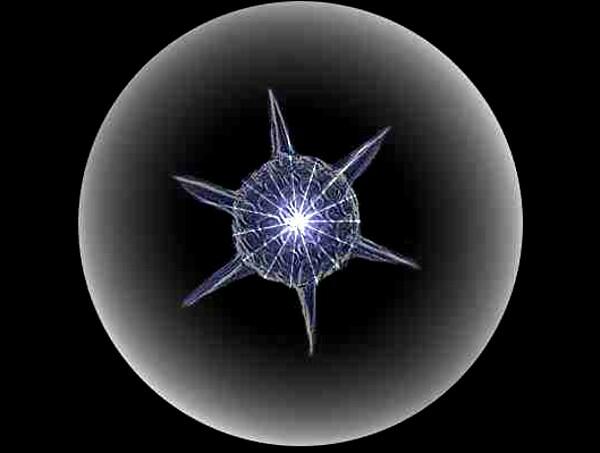
I am sure that this vision lasted for only a few seconds, but when it faded, I felt quite exhausted. Nonetheless, I felt compelled to ask yet another question. “You say you have no written language; how can that be?”
Zettel floated above a sofa near an area where I was sitting, and I must say, in great comfort.
“This is a planet with very high humidity as you will doubtless have noticed. We have tried countess experiments over millions of years to try to stabilize the crystals so that we can utilize them to produce what you would call books or manuscripts–to no avail. The crystals which we can use for this purpose are, unfortunately, all deliquescent; that is, they absorb moisture from our atmosphere. We write a page of text and the next day, it is all radically altered–new crystals have formed, old ones have disappeared and the entire thing is unintelligible. As a consequence we, and all of the organisms on our world have evolved in a way that, I suspect, you will find remarkably odd. Each of us, Bromonian, animal, plant, has precisely one half of what you would call our “brains’ devoted to a kind of networking which allows each of us virtually infinite access to information, not only about each other, but everything each has experienced–which, of course, means we must be extraordinarily tolerant and non-judgmental. I think your Internet is some sort of primitive analog. This form of communication does not work with all of the alien species we have encountered however.
These environmental conditions are extremely irksome, for we are beings with remarkable linguistic genius and we can use and translate a number of languages in the trillions. It is especially annoying because we can control so many other aspects of our environment as you will discover. Fortunately, we can often use the forms and means of other creatures to communicate with them. You were about to ask me for a map of the park for tomorrow’s festival. Now, you will understand why I cannot provide one, but I shall be pleased to be your guide and host. Good night.”
The next morning as I walked and Consul Zettel floated, I was cautioned, in strong terms, not to leave the paths. The park was full of strange creatures speaking in a variety of bizarre languages and they all avoided us scrupulously. I didn’t know whether this was a consequence of my presence or the Consul’s or both. Our promenade was peaceful and the park was filled with strange and beautiful objects for which our closest word is “flowers.” The first ones we encountered were beds of gigantic Egelalcs which when fully open were 10 to 12 feet in diameter.

These incredible beings possessed, as you can see, extraordinarily fine filaments projecting outward from a central mass, but even more remarkable was the fact that at brief intervals they would contract and then extend again making the entire area look like a bed of terrestrial fireworks. The Consul explained to me that these pulses were highly precise and constituted a complex language of considerable subtlety. I noticed that some filaments from the Egelalc nearest the pathway had extended up onto the walk. I bent down to examine them more closely and reached out to touch them when a blast of sound like a siren nearly shattered my ears. Stunned, I staggered back and it became clear to me that the intrusion had come from Dr. Zettel. “Never”, I was admonished, “never go anywhere near these creatures. Those filaments have an adhesive that is like your epoxy; it bonds instantly with anything organic. Had I not warned you, you would at this very moment, be inside the center being digested.” A wave of nausea swept over me and I walked quickly to a bench and collapsed; a quivering mass of nerves.
“Come, come”, Zettel consoled, “that’s why I insisted on personally being by your side. I will protect you from the dangers and show you the delights. You must admit that the lethality of the Egelalcs does, from a certain standpoint, enhance their beauty.” I was not so sure I agreed with this last statement and so remained silent.
“I think you will quite enjoy the next section we will visit.” Using a beam like a laser emanating from his central eye, he indicated a gently sloping area which was a gorgeous array of colors.
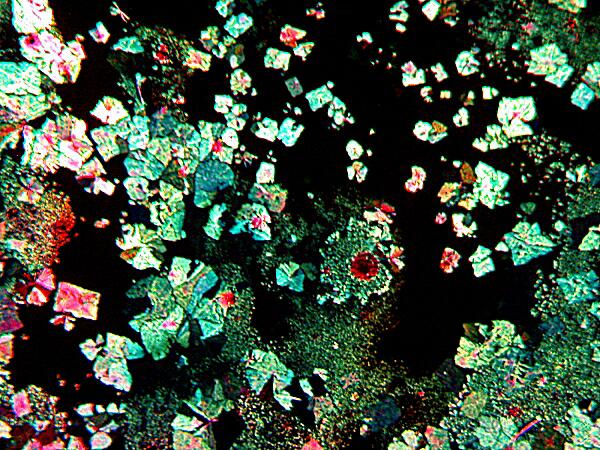
In his richly musical tones, he informed : “These are the flowers which are central to the festival. They are the Acetanorangenviol for which the park is named. Come let’s take a closer look.”
This garden section of the park was simply splendid and radiated a kind of peaceful energy. As we reached the major groupings, I noticed a spot where there were two reddish-orange and white “blooms” the size of my hand. They were very near the edge of the walkway and I started to back away. Again I heard Zettel’s gurgling chuckle.
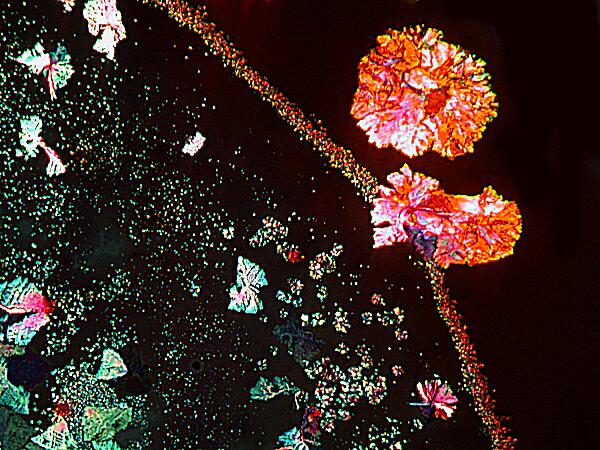
“No, no, my friend; there is nothing here to fear. On the contrary, some of our visitors find them far too friendly.” On seeing my bewilderment, he said: “They have reached a stage where they obtain their nutriment from the air and are just resting on the soil; they are not attached. Pick one up.”
I thought to myself: “You must be out of your mind!”
“Not at all! I assure you I am quite sane and I apologize for eavesdropping on your thoughts. I do so only when you exude anxiety. Otherwise I will always ask permission. So please, indulge me, pick one up; the upper one, I should think.”
With reluctance and some trepidation, I extended my trembling right hand and gently lifted the red bloom. The sensation was incredible for I had never felt anything so soft and silky; then I almost dropped it, because it began ever so delicately to nestle into the palm of my hand. However, the next event was utterly flabbergasting; this “flower” began to purr and I stroked it as though it were a kitten. The sensations were a wonderfully bizarre experience.
With deep amusement in his voice, Consul Zettel said :”Be careful or she’ll adopt you and you’ll have to stay here on Bromonia. They are very possessive and jealous creatures.”
With regret, I set this lovely organism back into the garden and I swear that I heard a slight whimper.
We walked on and arrived next at a large bed of snowflake flowers.
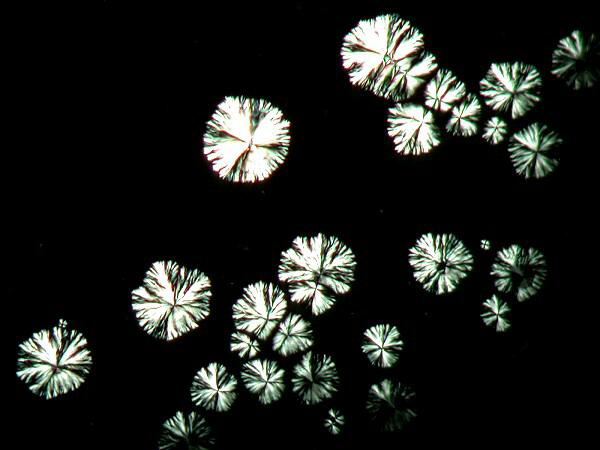
Quite a pleasing arrangement. The good Dr. Zettel distracted me–quite intentionally–and when I looked back at the snowflake bed, I realized that they had reduced their size and rearranged themselves into a different configuration.
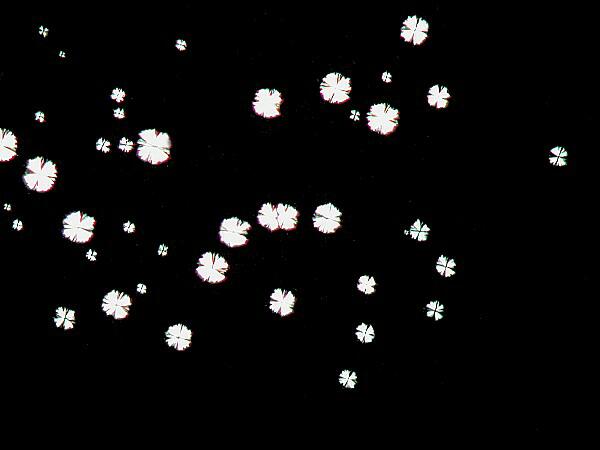
I commented to Zettel that it almost seemed as though these plants had some kind of intelligence and perception, because these changes in pattern only occurred when no one was watching.
Zettel focused all three of his eyes on me intently and said: “Over millions of years, we have learned that intelligence takes many forms and some of them are quite surprising. Nature is not much concerned with our preconceptions, although sometimes it does seem as though she wishes to give us moments of pleasure by allowing us to contemplate the intricate symmetries which she concocts before reducing things to disorder and chaos again.”
We wandered off toward another section of the gardens. Zettel continued: “Most reflective beings tend to think of flowers, and plants generally, as essentially passive, inactive organisms and this is, of course, quite untrue. This may be very difficult for you to grasp, because you come from a world which thinks of life only in organic terms, while we, indeed, accept organic life forms as one option–as is evidenced by your presence here–we on Bromonia are predominately crystal life forms. What you are going to observe next is a life form which is still something of a puzzle to us.”
In the center of a large and otherwise empty garden bed was a sphere at least a hundred feet in diameter.
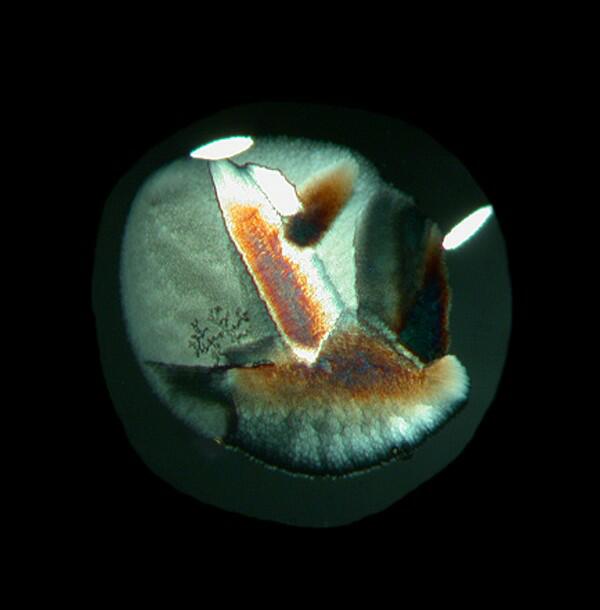
This sphere was translucent and inside it there was something large and oddly shaped which was slowly rotating. As we watched the speed of the rotation increased and then instantaneously the sphere disappeared leaving only the creature hovering above the ground.
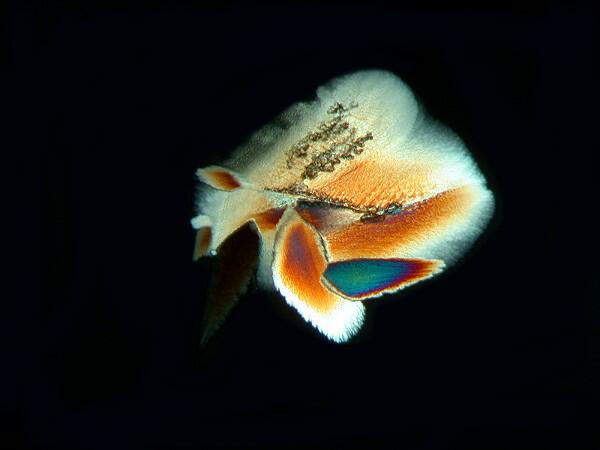
It remained so for only a minute or two and then like a chameleon, it radically changed color taking on a bluish cast.
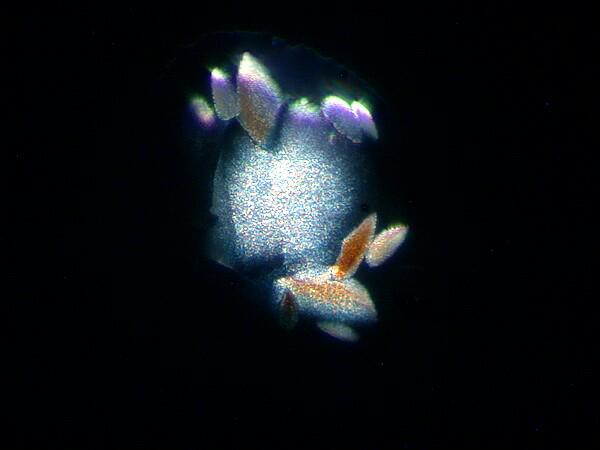
Zettel looked at me and said: “It will stay like this for about 5 minutes and then you will observe something rather dramatic. We call this organism Bromoniso and it performs this feat every year for the Festival of Flowers—even when we shift the date. This being seems to be unique; there is no trace of another one anywhere, neither in our history nor on the other worlds we have explored. It has an extraordinary longevity for, in our collective memories, this creature has always been here. Now watch.”
The organism again altered its coloration and began to expand rapidly until it was 10 times its original size.
“After 7 hours and 27 minutes, it will return to its original size, once again encased in its sphere. As your dramatist Agitate Lance or Shakespeare put it in his play about the demented Dane: “‘There are more things in heaven and earth, Horatio, Than are dreamt of in your philosophy.’”
He paused. “Well, let us proceed. There are still a few more things that I think might excite your interest.”
In fact, I was already stupefied. What I had so far seen was so utterly beyond my ken that I was bursting with astonishment, enthusiasm, and curiosity.
“This next creature is rather sinister. I am sure I remember learning that on your Earth you have carnivorous plants. However, I suspect they may not be quite on the scale of ours.”
Along the walkway, we were approaching a tower which had to be over 1000 feet high.
“Would you like to take the stairs or would you prefer the elevator?” Zettel asked smiling.
If he had had legs and had to climb, I would, out of sheer perversity, have chosen the stairs.
“The Oransol, as we refer to this creature, if encountered in the wild, is deadly.”
We had reached the top and walked out onto a platform at a height that was a bit disconcerting even for those who don’t suffer from acrophobia. Looking downward here was the view.
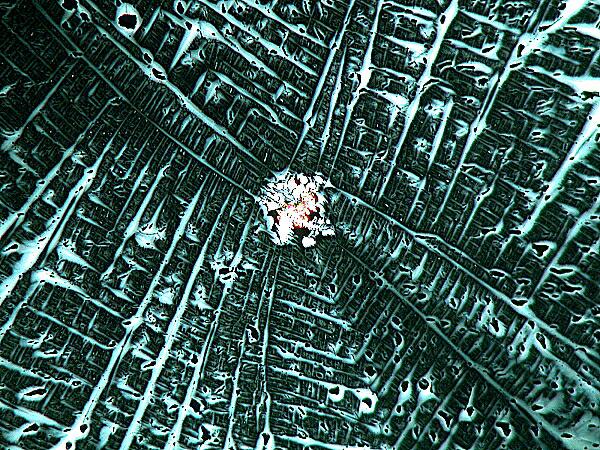
“The creature,” Dr. Zettel explained “is that white mass tinged with red sitting at the bottom. You notice all those parallel lines coming up toward us. The Oransol has evolved wheel-like appendages and after it spins out this net, it can glide up and down these tracks, rather like your trains, but with unbelievable rapidity or in the wink of a gnat’s eye, as someone must have said.”
I was slightly annoyed by the Consul’s manner and I said: “So, why don’t you just destroy such creatures instead of creating a glorified zoo?”
Suddenly his eyes were like fire. “These creatures are older than our race; what right do we have to destroy them? They are no immediate danger to us as long as one is not stupid and takes proper precautions. That is a great difficulty about your race; your first impulse is to destroy what you don’t understand.”
I felt deeply ashamed and apologized profusely. “Yes, we are a destructive species, but we are now trying to preserve many endangered organisms.”
“Yes, but far too late!” Zettel snapped. “But now it is my turn to apologize. I am being a rude host and you have journeyed here to learn and it is my duty to aid you, so let us set aside these unpleasantries.”
I had to admit that this creature was fascinating, but I was still feeling embarrassed and was anxious to move on.
The Consul sensed this and we descended from the tower. “I think you will find our next inhabitants pleasing both visually and tonally unless they are feeling impish and then sometimes they generate cacophony just to tease and annoy us. We are coming to a bed of Besolang. Notice there is a ray of light emanating from the center.”
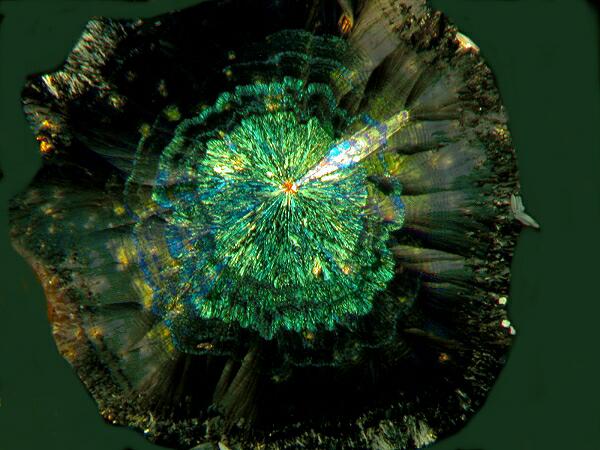
“Watch carefully, it’s going to indulge in a bit of visual exhibitionism. These creatures are cheering, whimsical, magnificent, and irritating.”
As I watched it began shooting out ray after ray of light like fireworks in slow motion until it became a virtual crystalline peacock as you can see below.
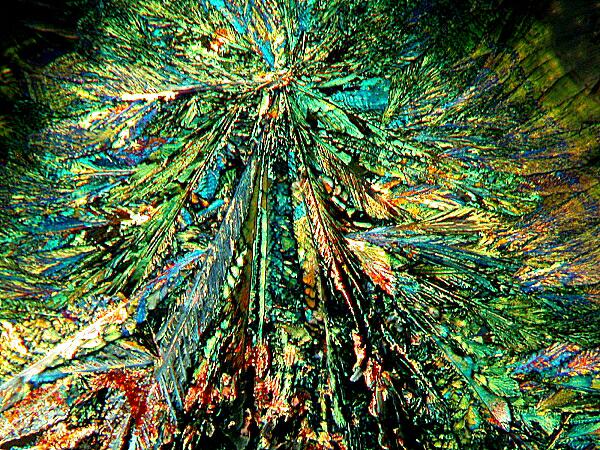
Zettel then directed my attention to another Besolang which was not visually performing, but from which there issued the most ethereal sounds I had ever heard in my life and I was moved to tears.
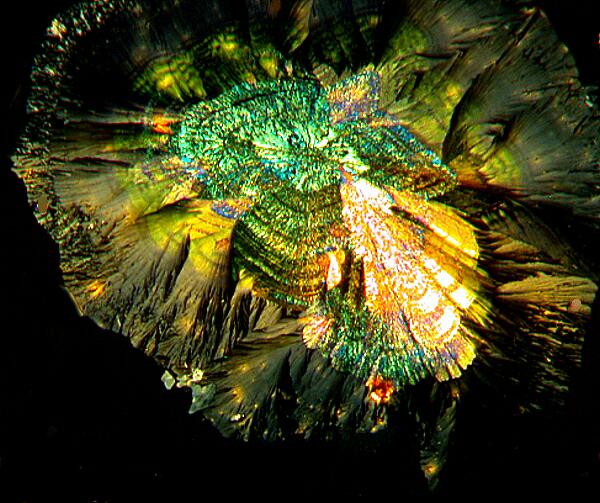
“This is a solo performance, “ Zettel remarked. “Most of the others are asleep at the moment, but sometimes hundreds of them will join together in cosmic harmonies that cannot be described. They can be heard for hundreds of miles and yet the sound is not overwhelmingly loud, but has a dynamic range of unparalleled beauty.”
I stood utterly entranced until finally the Consul broke in on my reverie by pointing out that it was well past noon and that I must be feeling hungry and, of course, when I thought about it, I felt famished.
“Come just a bit further down the walkway and I promise you a feast quite unlike anything you’ve ever had.”
We came to a lake and crossed a bridge to what looked somewhat like a gigantic lily pad. All along the edge were feathery growths which extended out into the lake.
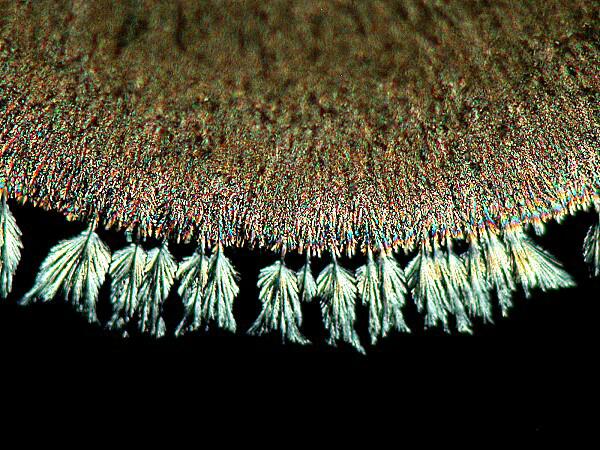
Zettel suggested that I might want to sit at the edge in a full lotus position so that I might be comfortable while I dined. I told him in no uncertain terms that I couldn’t imagine anything more excruciating. And again I got the gurgle-snort chuckle as he directed me to a very soft, comfortable, mossy bench.
“Now say ‘Hllkrnkectxz’ (pronounced ‘Kron’)” and as I did so the frond nearest me rose up out of the lake and positioned itself before me.
Zettel gave me further instructions: “Imagine something superbly delicious that you would like to have for your repast and then pluck one of the small fronds and chew it slowly.”
“Lobster in butter sauce, lobster in butter sauce,” I kept repeating in my mind. I plucked a frond, chewed, and was ready to move to Bromonia–it was without question the most exquisite culinary experience I had ever had. I began to ruminate on the idea of eating crystals and then reminded myself of how impoverished our gustatory experiences would be without salt and sugar. However, this was light years beyond that.
Zettel instructed me to imagine yet another gourmet delight and I conjured up pistachio ice cream with raspberry sauce sprinkled with tiny bits of chocolate. I plucked another small frond and concluded that another week here and I would be a chronic diabetic. The subtlety, the perfect blending of flavors was beyond words. I noticed that while I was indulging myself, Zettel had disappeared into the lake. I assumed that it was to feed and drink, but I didn’t ask not wanting to appear rudely curious.
Hunger satisfied, we returned over the bridge to the walkway. “I will show you three more blossoms and then take you back to your hotel to rest. We will have had a long day and tomorrow we will be visiting the royal Bromonian Zoological Gardens and that will also be a long day. In fact, it may require two or three days. We have a large number of animals which I think you will find rather exotic and curious in the extreme.”
We approached a gigantic, latticed dome which I quickly realized was an enormous trellis and covering it was a green and yellow vine with strange leaves curved like hooks. “This is an Ascaxzom which can provide you with a wide variety of olfactory sensations.”
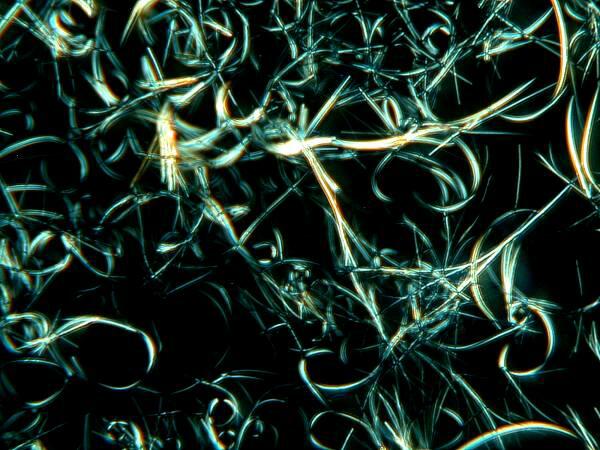
“It will extend a tendril and wrap it gently around your wrist and allow you to stroke a leaf. If it likes the way you do it, you will experience a lovely symphony of odors; if it doesn’t like the way you do it, I suggest you use your other hand to pinch your nose. You have on your planet a creature called a skunk. Its odor by comparison would be like a bouquet of roses, so do try to be tactilely affectionate.”
This was one of those classic instances when you feel like you have been set up for failure by being made so nervous that you know you’re going to get it wrong. The Ascaxzom’s tentacle encased my right wrist and as I reached out to pet the nearest leaf, it flipped away from my hand and did this repeatedly each time I tried to reach out. It was playing. Finally I simply extended my left hand, palm open and waited. The leaf approached my hand and then stroked it. It was a marvelous tickling sensation and I reciprocated with my fingertips. Instantaneously I was flooded with delicate and subtle odors; if you can imagine a piece of music composed with odors instead of tones then you’ll have some idea of what I was experiencing. The first “movement’ was a banquet of food odors which lasted over ten minutes opening with a yeasty fugue of the smells of baking breads, croissants, scones, tarts, and pies, then moving to the earthy smells of fresh vegetables simmering, and concluding with stupendous cadenzas of roasting meats. It was fortunate that I had just eaten; otherwise I might have attempted to ravenously devour the leaves of the Ascaxzom which Zettel had informed me were poisonous. The second “movement” centered around floral fragrances, some familiar, others not. The third and final movement consisted of odors utterly alien to me, but nonetheless quite pleasing and the coda was the olfactory equivalent of a waterfall. I wanted to applaud rapturously, but I felt that might be threatening so, once again, I stroked the leaf gently with the tips of my fingers. The Ascaxzom tendril released my wrist and curling upward caressed my cheek ever so softly. I was deeply moved and by a creature so radically different from me that it was incomprehensible, but also a source of joy and hope. Zettel remained silent for he clearly understood the extraordinary emotions that I was feeling and for that I was deeply grateful.
I left the Ascaxzom with a deep sense of regret.
Zettel and I continued through the gardens. There were many other Bromonians and intelligent aliens about, but they continued to remain distant from us. Nonetheless, the sense of celebration at this Festival of Flowers permeated the air. Our next encounter was with “The Remarkable Flying Flower”, the Mogsolac–I felt like I should be a barker at a carnival.
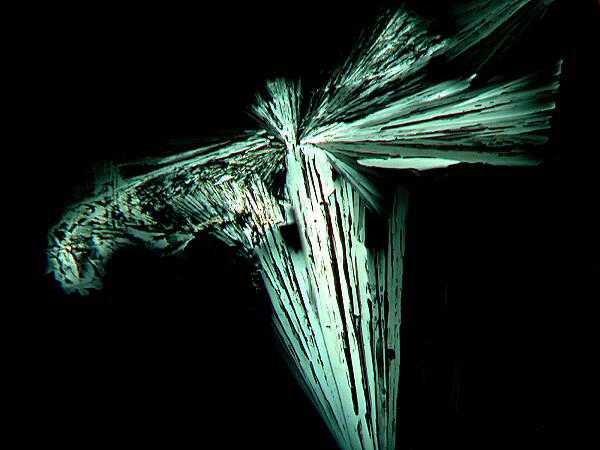
A flying flower!–now that’s a remarkable being! Yes, on Earth we have plants–dandelions, thistles, etc. which produce seeds that “fly”, actually drift, on wind currents-but this was the flower itself and it functioned like a cross between a helicopter and a dragonfly. What a spectacle! Had I not been fortunate enough to have recorded an extensive number of images and a few bits of video, my colleagues on Earth would have branded me a maniac and had me committed to an asylum.
The Mogsolac could soar to several hundred feet in a matter of seconds and then its “rotors” would alter their angle and it began to expel seeds from its body which the “rotors” would scatter over great distances. I hoped that we could eventually send a team of aeronautical engineers, botanists, and zoologists to Bromonia to learn more about the many mysterious aspects of this world.
Our last stop for the day was at the garden of the Ventascol. I am still trying to grasp the nature of these creatures. Unfortunately, I was only able to capture a single image of one.
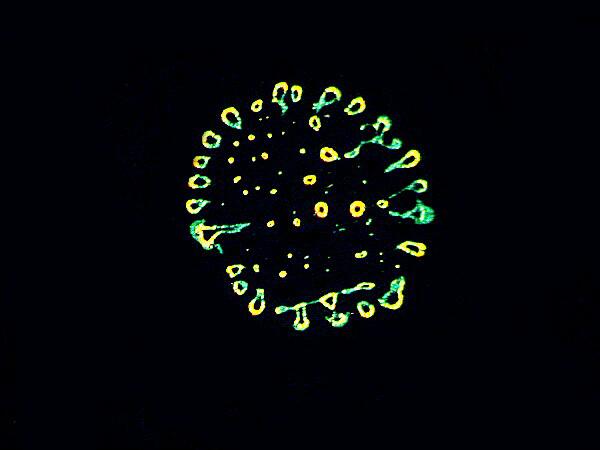
These are chromothermal organisms. This one in the image was radiating at a gentle 65 or 70 degrees Fahrenheit. However, a few minutes later it turned an icy-blue and white and the effect was like being trapped in an Antarctic wasteland. Then just moments later, it became a fierce orange-red and I felt like I was inside of a blast furnace.
“I do wish this thing had a thermostat,” I said to Zettel.
He made an expression which I interpreted to be a smile and replied: “It is simply amusing itself and at our expense. These are intriguing but rumbustious creatures. Let us return to your hotel.” We returned to the marina and went aboard a boat rather like our hovercraft. You may remember that my hotel was essentially an island. As we approached it, I noticed high in the sky above the area a bizarre object which was floating and rotating. The Consul followed my gaze and said; “Ah, you’ve noticed one of our satellites. I’ll show you some others tomorrow. In the sitting room of your suite on the north wall, there is a viewing screen, 15 x 20 feet and you can watch your television programs from Earth, if you like.”
“Why would I want to do that? Most of them are dreadful muck!”
Zettel smiled again and said: “Yes, we rather think so too, but occasionally our computers pick up some interesting tidbits about your cultures. Actually, the nature programs that show your life forms are the ones of primary interest to us. However, if you are not interested int the transmissions from Earth, there are 87,256,112 other worlds to choose from, but some of their languages are extremely difficult. Sometimes we can provide subtitles, but in other case we have only language tutorials available.”
This last conversation had utterly exhausted me–too much information, too many new experiences; a conceptual and perceptual overload. Zettel left. I ordered a sumptuous meal from room service, took a shower and collapsed into bed.
All comments to the author Richard Howey are welcomed.
Editor's note: Visit Richard Howey's new website at http://rhowey.googlepages.com/home where he plans to share aspects of his wide interests.
Microscopy UK Front
Page
Micscape
Magazine
Article
Library
Please report any Web problems or offer general comments to the Micscape Editor .
Micscape is the on-line monthly magazine of the Microscopy UK website at Microscopy-UK .